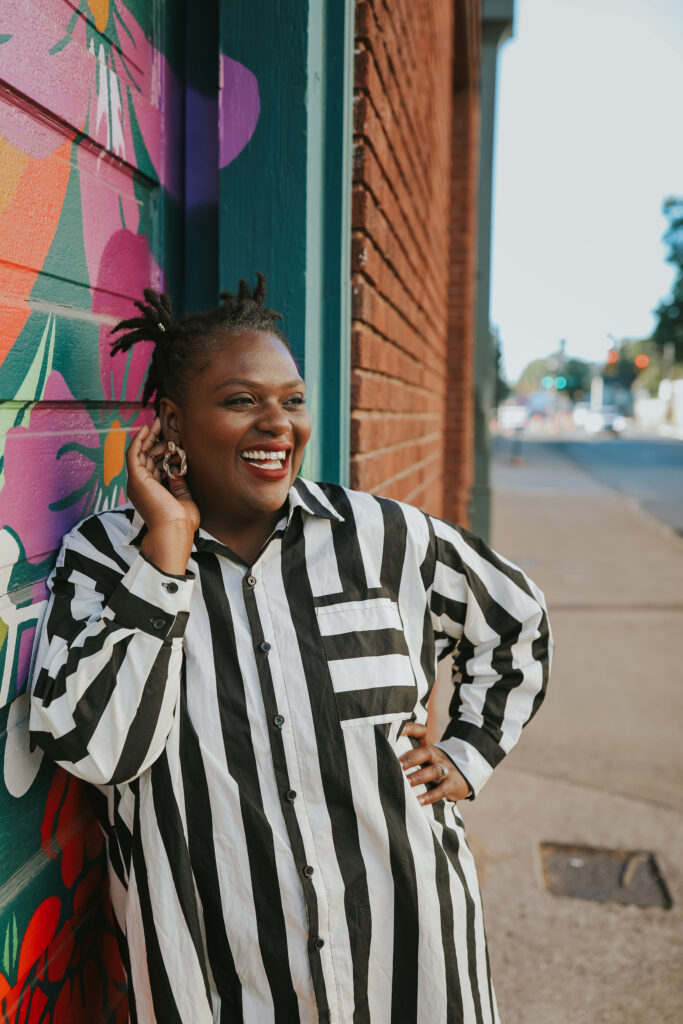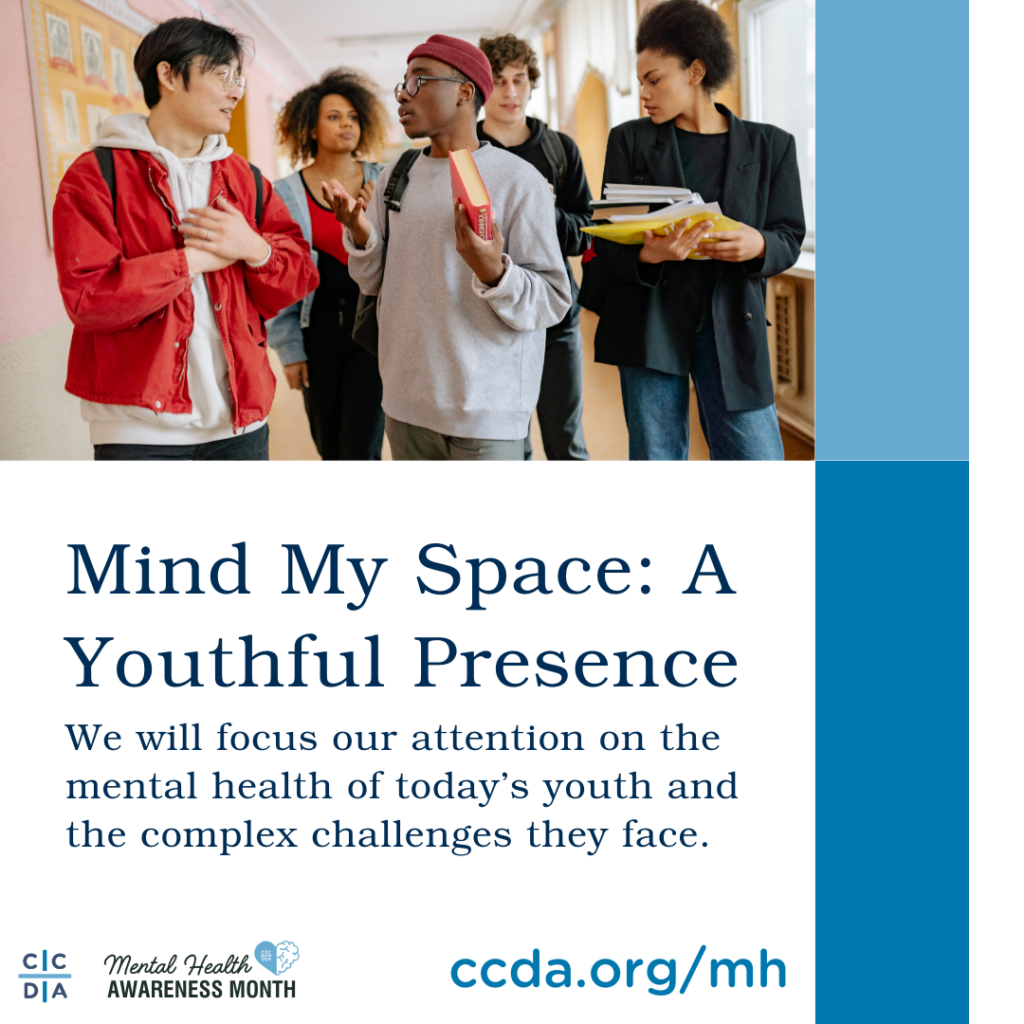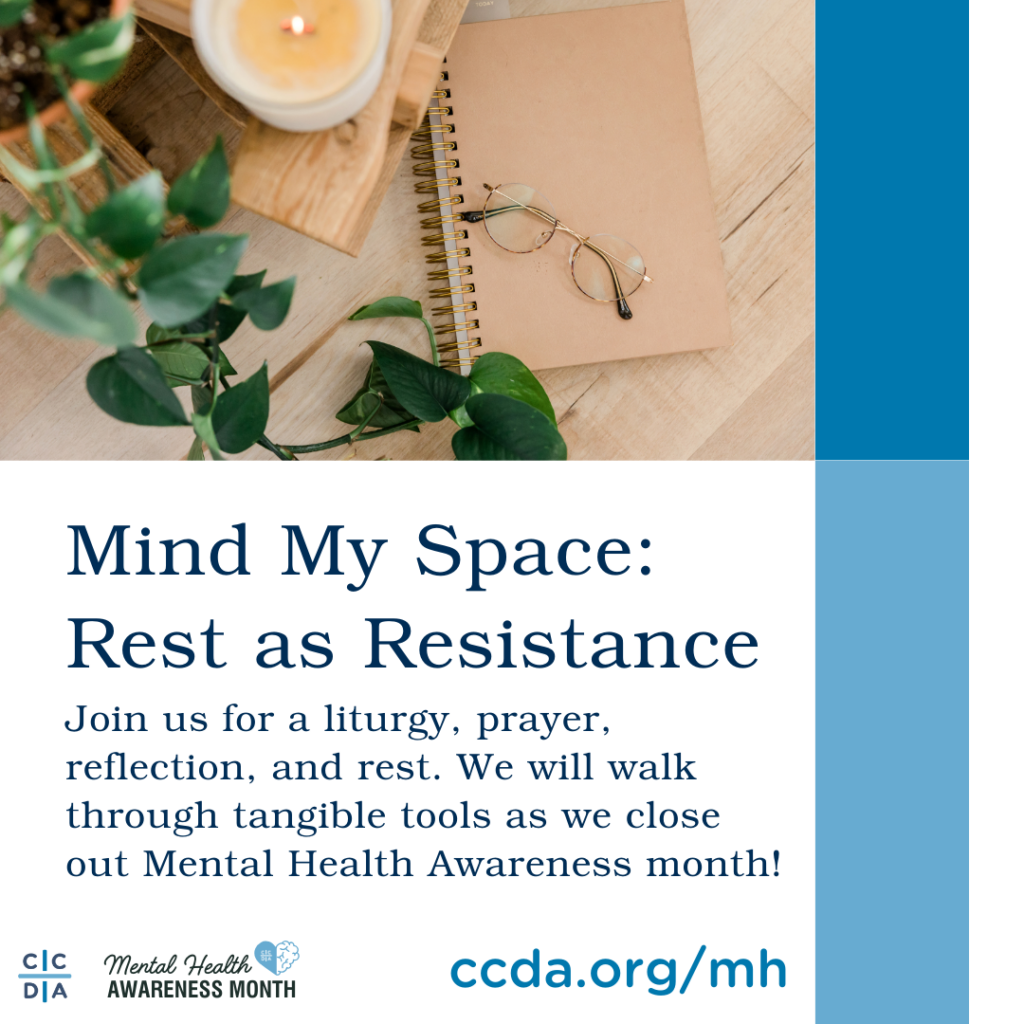This post is part of CCDA’s Mental Health Awareness Month. CCDA has a plethora of options to increase your mental health support, and we are constantly adding new resources to help you and your community flourish.
Join us for an event, complete the Mental Health Survey, or download the Mental Health Toolkit.
May we practice the art of abiding.
“I have said these things to you, that in me you may have peace. In the world you will have tribulation. But take heart; I have overcome the world.” John 16:33 ESV
“As the Father has loved me, so have I loved you. Abide in my love… These things I have spoken to you, that my joy may be in you, and that your joy may be full.” John 15:9,11 ESV
Fellow practitioners of justice, equity, and diversity, I see you. I imagine many of you are like me. Working with men, women, and youth who are struggling to grapple with how our country is changing.
I imagine many of you are working overtime to remind your clients about the importance of hope. I imagine we are all still making room for so much sadness, disappointment, and pain. Yet, what we know as practitioners is that grief, pain, and sorrow all point to a deeper longing for more.
A longing for maybe, even, a more just world. A more equitable world. In our longing for something better, I hope we never lose sight of the joy in front of us.
What are the small or big things that bring you joy right now?
Remembering that our work of activism and setting what’s wrong right requires joy, too.
Remembering that we can have joy in the midst of our sorrow. Now, I am not speaking of a joy that makes me forget the sorrow.
But a joy that allows me to hold both. A joy that honors the pain, suffering, and grief. A joy that allows for deep belly laughter. A laughter so deep it makes you cry just a little, from the corner of your eyes.
A joy that makes room is deeply grounded in our faith. Our faith reminds us that our peace is in Him. Our peace is in the one who stood before time and holds time in His hand. Our peace is ultimately protected by Him, the one who died and rose again with all power in His hands.
Our peace is in Him.
These verses in John 15 remind us to abide. Abide in Him so that we can be reminded of peace, and so that our joy may be complete. But what does this mean tangibly for our everyday practice?
I think it’s not just looking for optimism, it’s not just focusing on the good. It’s not just being more positive. It’s about being more rooted. More connected.
What would it mean for you to be deeply rooted?
A Holistic Approach to Abiding
In this scripture, I think Jesus is saying we need to be rooted or should abide in Him. However, I want to look at this more holistically. A holistic approach would not necessarily be in disagreement with Scripture, so let’s explore more.
The holistic approach I am proposing is to find ways to abide spiritually, mentally, emotionally, socially, and even biologically/physically.
Spirituality may be easy to see. Abide in Jesus. Abide in the word, abide in the things that remind you of the truth of who God is in a world that is far from perfect. A world that may look as if only a few strive for justice. Abiding means being reminded of the truth. Peace is yours. This is our truth to hold onto.
Abiding Mentally or Emotionally
To abide mentally or emotionally means doing the work. Getting connected to resources that help you find relief from anxiety, depressive mood, depressive thinking, and so forth.
Emotionally and mentally abiding means practicing self-compassion and a personal truth-telling of sorts. I often say to my clients that our trauma or pain causes us to tell half-truths to ourselves. I often challenge my clients to tell their bodies the whole story.
Who are you really? What are you capable of? Who are you really connected to? What have you survived? What resources are available to you?
Remember, abiding is not just looking at optimism, but being rooted in truth, the whole truth, the full story. Compassionately challenging ways you may get stuck in some unsupportive habits of the heart and mind. And reminding yourself that there are resources accessible to you for freedom.
Compassion is about reminding ourselves that whatever we want to change, we can, and it just takes us connecting to the resources that are available to us. Now those resources may be therapy and psychiatry. I hope we all have enough compassion to lean into the resources available to us.
Abiding Socially
To abide socially is not just about “hanging out with friends or family.” Instead, I would define this as having meaningful work and meaningful connections with people who help you feel safe.
We need meaningful connections with real people who love and care for us. And also the work we do has to matter to us and the world. It’s gotta mean something to you. Social connections help us to feel more safe in a world that is bent on being unjust.
Let’s be practical here: connecting with friends may be exchanging mini “podcasts” (voice notes) from week to week. That’s okay. That’s a realistic way to connect and be seen by others in our busy world. Lean into this as often as you can. Lean into connection via any medium that makes sense for you and your community.
Abiding Biologically
Biologically abiding is about the body. It’s about attunement and awareness. The act of tending to your own body. This body that continues to carry you from strength to strength.
How can you make space, in real-time, for your body to rest, and your body to eat, sleep, drink, and move? I’m not just asking us to exercise three times a week, although that would be helpful.
I’m asking us to move our bodies with intention. To eat in such a way that your body comes more alive. Do not neglect this body that continues to carry you through all the good, the bad, and the ugly. This body, whatever version of yourself that sits right now, has carried you this far. Thank your body for that.
Abiding can be holistic.
To abide in God means to abide in His love and His peace. To abide means we make room for the reality of what it means to hold joy and sorrow together. In our fight for justice, we should always come back to our breath and our body. These bodies carry us through. These bodies hold the memories and experiences of joy, sorrow, and everything in between.
We can teach our bodies to lean into the tension of holding these things together. Honoring the joy that brings deep laughter. And honoring our humanity that grieves and moans about the pain we see and experience in our lives. We hold these things in tension. They are both precious and valuable parts of our journey toward justice, equity, and diversity.
So, friends, I pray we practice abiding in His love, joy, and peace.

About Joi McGowan, LPC
Joi McGowan is a licensed professional counselor and co-host of the Resilient Black Women Podcast hosted by KUAF Radio. She’s an advocate for mental health for Black Women and women of color, reminding them that they do not have to be strong all the time. She’s excited to share more about the intersection of mental health and culture.







